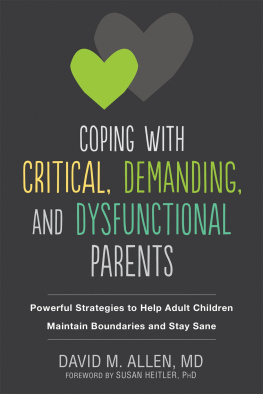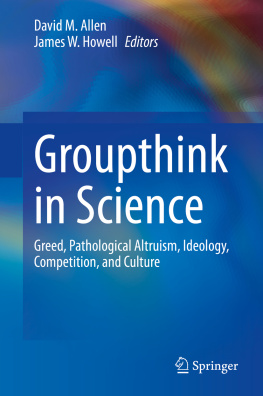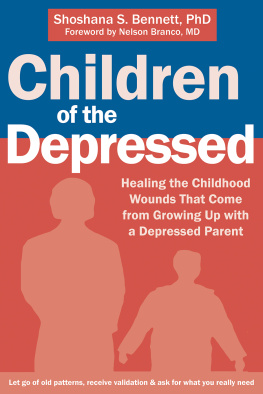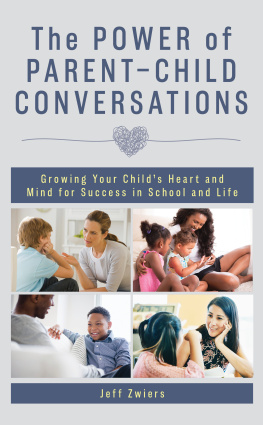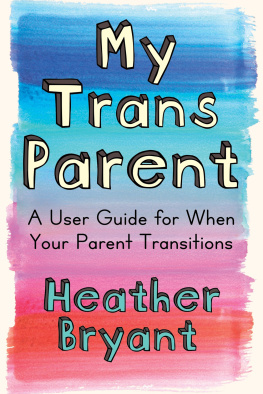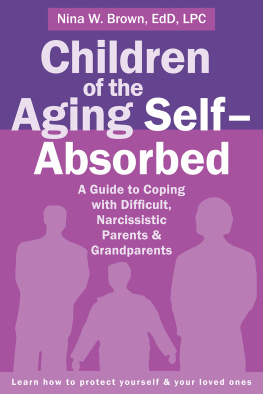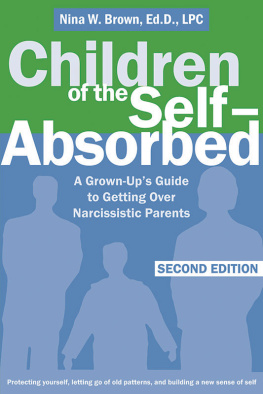coping with
critical, demanding,
and dysfunctional
parents
Powerful Strategies to Help Adult Children
Maintain Boundaries and Stay Sane
DAVID M. ALLEN, MD
FOREWORD BY SUSAN HEITLER, PhD
uncorrected proof
Coping with Critical, Demanding, and Dysfunctional Parents David M. Allen, MD
mock title page
for placement only
uncorrected proof
Publishers Note
This publication is designed to provide accurate and authoritative information in regard to the subject matter covered. It is sold with the understanding that the publisher is not engaged in rendering psychological, financial, legal, or other professional services. If expert assistance or counseling is needed, the services of a competent professional should be sought.
Distributed in Canada by Raincoast Books
Copyright 2018 by David M. Allen
New Harbinger Publications, Inc.
5674 Shattuck Avenue
Oakland, CA 94609
www.newharbinger.com
Cover design by Amy Shoup
Acquired by Ryan Buresh
Edited by Kristi Hein
All Rights Reserved
Library of Congress Cataloging-in-Publication Data
TK
20 19 18
10 9 8 7 6 5 4 3 2 1
First Printing
uncorrected proof
Contents
uncorrected proof
uncorrected proof
Foreword
My client Alice had long felt angry at her mother and father. In Alices childhood, her mothers self- absorption and her fathers habitual stance of critic- in- residence had made the pair less than ideal parents. Alas, little had improved in her parents attitudes toward her through the early years of her adult life.
Yet, as she entered her middle- aged years, Alice found herself wishing again that she had parents with whom she could talk, loved ones with whom she could share her joys and sorrows and hear theirs as well.
With David Allens new book, the odds zoom upward that
Alice will be able to make her wish come true.
Alices desire to connect in healthier ways with her parents exemplifies one of the ways that human beings differ from animals.
With maturation into adulthood, a dog, cat, bear, horse, bird, or lion does not know, or seem to care about, the parents who sired and raised him. With adult ability to survive without the guidance of an elder, animals parent- child bonds dissipate.
Not so with us humans. We tend to treasure our relationships with family members. We naturally seek to sustain those relationships, at least if the relationships have the potential to feel nurturing in at least some way.
It turns out, too, that caring for elder parents enhances our caring toward them. We love those whom we take care of. So as our parents age, renovating the relationship with difficult parents offers potential for major gratification on both sides of the relationship.
Dr. David Allens approach reflects his belief in integrative psychotherapy.
uncorrected proof
vi
Coping with Critical, Demanding, and Dysfunctional Parents As a leader in the integrative psychotherapy movement, Dr.
Allen combines multiple therapeutic approaches. He masterfully interweaves cognitive- behavioral interventions designed to teach new thinking and communication skills with psycho-dynamic
explorations into where the old patterns were learned. In addition, he combines a focus on individuals with a family systems theory perspective that broadens his focus to explorations of the reactions of parents, offspring, and siblings.
Study after study of psychotherapys effectiveness has found that this kind of integrative approach to treatment most benefits clients.
Readers of this self- help book can benefit similarly.
Dr. Allen took on an ambitious project in writing this book.
Can an excellent family therapist specify clearly enough what he does with his clients that readers then can replicate the process as self- help? I can relate to the difficulty of this project, as in writing my book Prescriptions Without Pil s I undertook a similar challenge. Its not an easy one. And yet Dr. Allen has succeeded admirably.
Dr. Allen walks readers step by step through a process of reconciliation and renovation that has genuine potential for leading to the promised land of a loving parent- offspring relationship. With a voice as steady as the ones we hear on Google Maps or Waze, Dr. Allen guides you through the important process of relationship
improvement.
Bravo, Dr. Allen, for this brilliant contribution to the enhance-ment of adult- to- adult family connecting.
Susan Heitler, PhD
uncorrected proof
introduction
Your Needs for Warmth
and Acceptance
For many of us, our parents are a primary source of much of what is good in our lives. When we are children they take care of us and meet our basic needs for food, shelter, and human warmth. They protect us and stop us from doing things that might cause us harm.
They support us without overprotecting us. They teach us how to negotiate our social world to get what we want and need. They are a source of love and warmth that lasts a lifetime. We look forward to getting together with them to celebrate birthdays, holidays, graduations, job promotions, weddings, and the births of our own children or to being with them just because we enjoy their company.
We think of them fondly, and when they pass away we feel an acute sense of loss.
If you have picked up this book, chances are that these warm feelings are missing. Instead, you may well have a sense that your parents think there is something horribly wrong with you. Perhaps you experienced negative parental responses to the things you liked to do and were interested in. You may have felt that you were a disappointment or embarrassment to your parents in some way, or that your emotions are too dramatic or you are overly sensitive for their tastes. Their repetitive and compulsive negative reactions to your life choices, and the things you ask of them, may have led you to feel uncorrected proof
Coping with Critical, Demanding, and Dysfunctional Parents that they think you demanded too much of them, or even that you should do more for them.
Others of you may feel that your parents frequently act like children themselves, and that you are sometimes the only one in the room acting like an adult. In a way, you have had to parent your own mother or father or both. They may complain to you about one another as though you had the power and duty to fix their
marriage.
Perhaps you believe that, despite their seeming to love you sometimes, your parents do not really value you. Basically, your parents behavior toward you is invalidating, critical, demanding, hateful, or otherwise dysfunctional. It is not out- and- out abusive (if you do come from a family that inflicts overt, significant physical or sexual abuse, this book is no substitute for working with a knowledgeable therapist). It is likely that not all your interactions with your parents were or are unpleasant. Rather, the unpleasantness is limited to certain times and places, or concerns specific life activities such as school, career, or dating. Their negative behavior is not ever- present; you may have noticed that your parents seem like good folks in other contexts, with friends and coworkers who seem to enjoy their company and respect them. You may have observed your parents engaged in pleasant interactions with these outsiders. Other people may even have told you that you are lucky to have parents like them.
Nonetheless, your parents are difficult with you . They invalidate you meaning they ignore your feelings and ideas, tell you or others that your ideas are stupid or crazy, or claim to know how you are feeling as if they knew that better than you do yourself. They insinu-ate themselves in your life, taking it upon themselves to criticize the choices youve made or to dictate what you should or shouldnt do.
Next page
